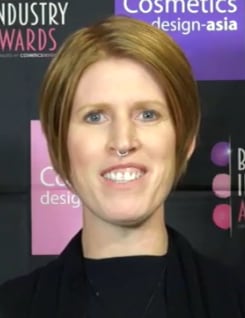Last Thursday at Meredith Corp’s new offices in Lower Manhattan, Cosmetic Executive Women hosted a panel event entitled The Institutionless Consumer.
The consumer in question is the beauty shopper who trusts people more than brands and has gravitated to indie beauty in recent years, drawn in by the genuine stories of indie brand leaders, the simplified ingredient strategies, and the opportunity for direct engagement with niche brands (like what’s happens on social media).
As a CEW promo for the event put it, “There’s a new breed of beauty consumer who values trust and authenticity as much as the products themselves.”
The panel, moderated by Jenny B. Fine, executive beauty editor of WWD, included Lisa Feierstein, trend strategist at TrendWatching; Marcia Kilgore, founder of Beauty Pie; Molly Landman, global brand director of Unilever’s Love Beauty & Planet and ApotheCARE Essentials brands; and Shane Wolf, international brand general manager for L’Oréal’s newly launched Seed Phytonutrients brand.
New niche brands
The new brands from Unilever and L’Oréal were developed very much in the image of successful indie brands but with the know-how and resources of multinational beauty makers.
Unilever created the Love Beauty & Planet and ApotheCARE Essentials as “new brands [that] harness the scale of what Unilever does well,” says Landman. The company wanted to “put forward new innovation,” “to make things that felt like they were not from Unilever,” she says, quickly adding that the company never shies away from the fact that Love Beauty & Planet and ApotheCARE Essentials are Unilever brands.
L’Oréal’s new brand Seed Phytonutrients was developed by “five people in Buck’s County [Pennsylvania],” according to Wolf. The brand, Wolf says, “operates completely independently.” And, an item on L’Oréal’s site, affirms as much, saying, “Seed Phytonutrients operates as an independent venture funded by L’Oréal. The brand has access to Group experts in everything related to product design but can also work with independent partners and suppliers.”
Curiously, for a brand pioneering a new business model that’s meant to renew consumer trust in big beauty, Seed snuck under the radar and exhibited at this month’s Indie Beauty Expo in Dallas, Texas. (IBE defines 'indie' as 50% founder owned.)
Big industry players have moved fairly swiftly from acquiring indie brands, to incubating startups, and on to developing niche brands. What’s happening now is next-generation intrapreneurship. And, Wolf sees it a way to disrupt the beauty and personal care industry from the inside. Reflecting on the recent Seeds launch, he says, “we actually made a difference in an industry that needed to change in [regard to] sustainability.”
New savvy consumers
In response to a question about how big beauty can effectively reach consumers by launching indie brands and not leave them feeling duped. Feierstein advises that beauty makers “focus on people who don’t care if indie is indie” and instead, “deliver on what people like about niche…. Do niche,” she says, “do it best, be accessible, and give your brand a human face.”
But it’s not just new brands that are using these strategies, existing legacy brands have been doing it lately too: like when Coty did work to connect the Sally Hansen nail brand with Sally Hansen the entrepreneur; or when Unilever leveraged storytelling to better market its iconic Vaseline brand.
But what about consumers that want the transparency of indie beauty, proven product benefits, and simply aren’t interested in brand stories?
To meet these consumers’ needs, Kilgore’s Beauty Pie is disrupting beauty by bypassing brands altogether. Beauty Pie is, she says, fundamentally a buyers’ club where shoppers pay for membership and can buy beauty products made by top manufacturers at cost.
All told, the way consumers discover and consume beauty is changing; and corporations, brands, and entrepreneurs are all busy developing product and building strategies to meet that demand.
---

Deanna Utroske, CosmeticsDesign.com Editor, covers beauty business news in the Americas region and publishes the weekly Indie Beauty Profile column, showcasing the inspiring work of entrepreneurs and innovative brands.
